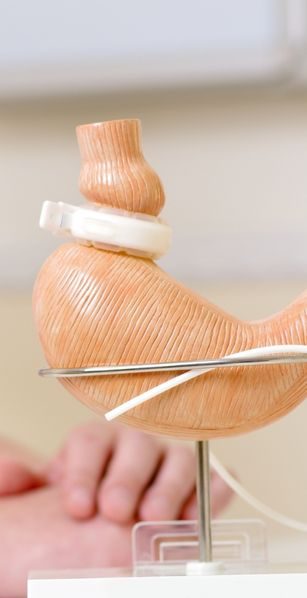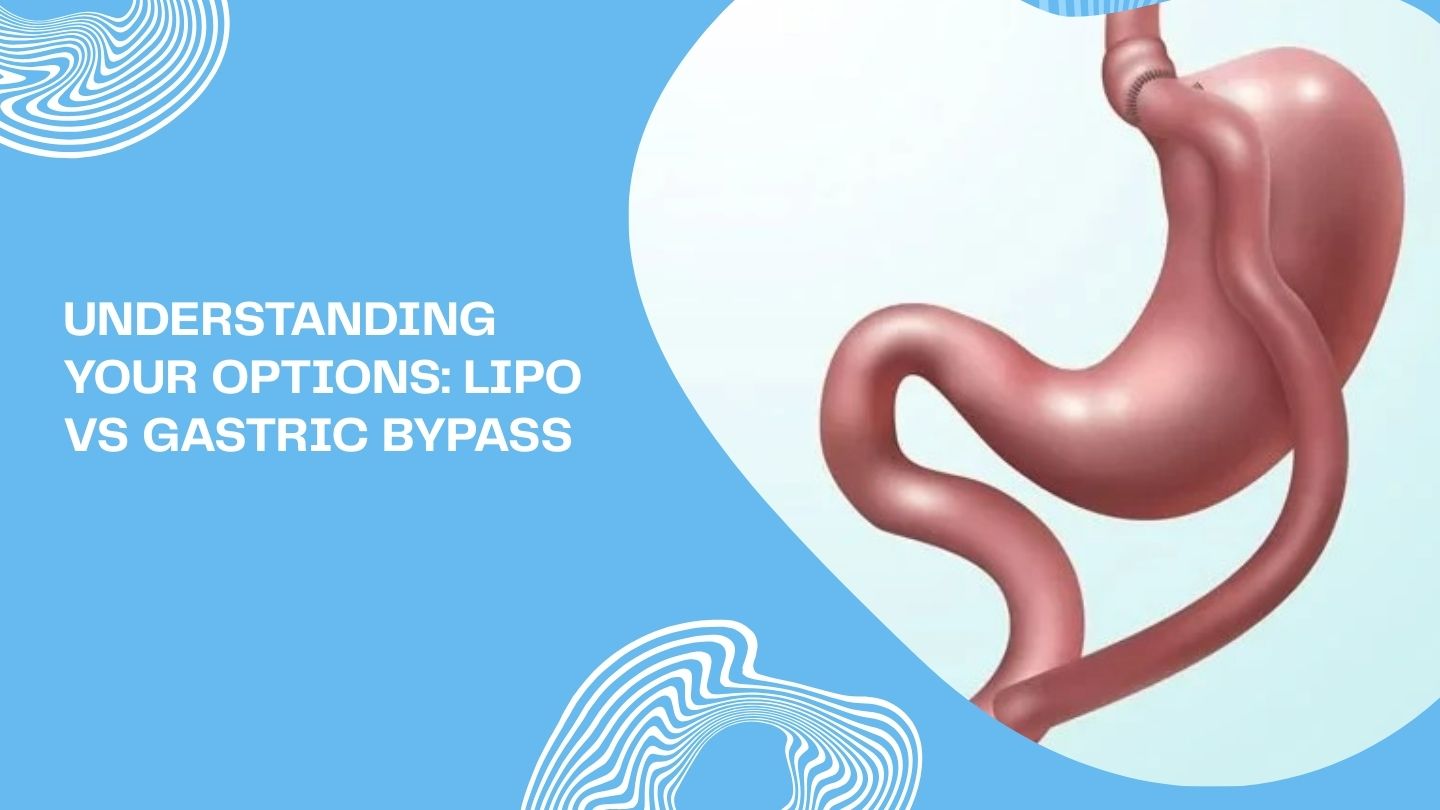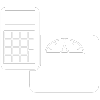What is Lap-Band Surgery?
Discover how our experienced surgeons can help you achieve effective, sustainable weight loss with Lap-Band surgery.
Lap-Band Surgery
Laparoscopic gastric banding, also known as gastric band surgery, lap-band surgery, or adjustable gastric banding, is a popular weight-loss surgery designed to help patients achieve significant and sustainable weight loss. Unlike more invasive bariatric procedures, Lap-Band surgery is minimally invasive and adjustable, offering flexibility to suit individual weight loss needs. In this procedure, a silicone band is placed around the upper part of the stomach, creating a small pouch that limits food intake. The band can be tightened or loosened over time to adjust the size of the stomach pouch, allowing for gradual weight loss and improved long-term results with the guidance of a qualified lap band surgeon in East Cobb.
Meet Your Surgeon

Dr. Jean-Pierre
After his general surgery training in Chicago, Dr. JP began his fellowship with a concentration in bariatrics at the Morehouse School of Medicine through Atlanta Medical Center. He is a fellow of the American College of Surgeons and the American Society of Metabolic and Bariatric Surgeons.
How It Works
Procedure:
Stomach Restriction:
The surgeon uses a laparoscopic technique for gastric band placement, where an inflatable silicone band is placed around the upper part of the stomach. This band creates a small stomach pouch, which limits the amount of food the patient can consume. The pouch typically holds only about one ounce of food, promoting portion control and reducing calorie intake. By reducing the stomach size, patients are able to feel full after eating small amounts of food, which leads to consistent weight loss.
Adjustable Band:
One of the key features of Lap-Band surgery is the adjustable nature of the gastric band. The band can be tightened or loosened over time through a port placed under the skin. This allows for personalized adjustments based on the patient’s progress and needs. If a patient requires more restriction, the band can be filled with a saline solution, making the stomach pouch smaller. Conversely, if the patient experiences discomfort or difficulty eating, the band can be loosened.
Laparoscopic Surgery:
Lap-band surgery is performed using a minimally invasive laparoscopic technique, meaning small incisions are made in the abdomen. This allows the surgeon to insert a camera and specialized instruments to perform the surgery. The laparoscopic approach reduces the risk of complications, promotes faster recovery, and leaves smaller scars compared to traditional open surgery.
Average Surgery Duration: The typical duration of Lap-Band surgery is around one to two hours, depending on the patient’s anatomy and any complications that may arise. The laparoscopic technique allows for a quicker procedure compared to other bariatric surgeries.
Recovery
The recovery process for Lap-Band surgery is generally quicker than other weight-loss surgeries due to the minimally invasive nature of the procedure. Most patients stay in the hospital for about one day after surgery for observation and initial recovery. However, patients may experience mild discomfort, bloating, and soreness for a few days post-surgery.
Full recovery usually takes about 4-6 weeks, during which patients gradually transition from a liquid diet to solid foods, following the dietary guidelines provided by their healthcare team. The dietary plan initially focuses on clear liquids and progresses to soft foods as the stomach pouch heals. Patients are advised to eat slowly and chew their food thoroughly to avoid complications like band slippage or discomfort.
Patients will also need to attend follow-up appointments with their healthcare provider to ensure proper band adjustment, monitor weight loss progress, and manage any potential complications.
Potential Complications
While Lap-Band surgery is considered a safe and effective weight-loss procedure, there are some risks and potential complications to be aware of:
- Band Slippage: One possible complication is band slippage, where the band moves out of place. This can cause discomfort, nausea, and difficulty eating. In some cases, additional surgery may be required to reposition the band.
- Band Erosion: Over time, the band may erode into the stomach wall, which can lead to pain, vomiting, and infection. This may require the removal of the band and potentially another bariatric procedure.
- Infection: As with any surgical procedure, there is a risk of infection, particularly around the port site where the band is adjusted. Proper care of the incisions and monitoring for signs of infection are crucial to prevent complications.
- Nutritional Deficiencies: Although Lap-Band surgery does not significantly alter the digestive process, patients may experience deficiencies in essential vitamins and minerals, particularly if they do not adhere to dietary guidelines. Nutritional counseling and supplementation are often necessary to avoid deficiencies, especially in vitamins like B12, iron, and calcium.
- Difficulty with Food Intake: Some patients may experience difficulty swallowing or eating certain foods, especially if the band is too tight. It is important to follow the post-operative dietary plan to avoid discomfort or vomiting.
- Weight Regain: Over time, some patients may experience weight regain if they do not follow the prescribed dietary and lifestyle changes. The lap band is most effective when patients commit to a healthy, balanced diet and regular physical activity.
Weight Loss Expectations
Weight loss expectations with Lap-Band surgery can vary, but on average, patients can anticipate losing between 40% to 60% of their excess weight within the first two years. This means if you have 100 pounds of excess weight, you could lose approximately 40 to 60 pounds during this period. Individual results depend on factors such as starting weight, overall health, and adherence to post-operative dietary and exercise recommendations. Regular follow-up appointments with your healthcare provider are essential to monitor progress and make necessary adjustments to the gastric band, ensuring optimal weight loss.
Long-Term Considerations
Patients who undergo Lap-Band surgery typically lose 40% to 60% of their excess body weight within the first two years. The adjustable nature of the band allows for gradual weight loss, which can be sustained long-term with proper lifestyle changes. However, the success of the procedure depends largely on the patient’s commitment to making lasting changes to their diet and physical activity levels.
For example, if a patient has 100 pounds of excess weight, they can expect to lose approximately 40 to 60 pounds within this period. Regular follow-up appointments with healthcare providers are essential for monitoring weight loss, adjusting the band as needed, and ensuring the patient’s nutritional needs are met.
Next Steps After Lap-Band Surgery: Maintaining Your Progress
After Lap-Band surgery, maintaining weight loss progress requires an ongoing commitment to healthy lifestyle changes. Patients should adhere to a balanced diet, focusing on portion control, nutrient-rich foods, and regular exercise. Regular follow-up visits with your healthcare provider are essential to monitor weight loss, adjust the band if necessary, and ensure nutritional needs are met. Emotional and psychological support may also be beneficial to help manage challenges and maintain motivation. By sticking to these habits, patients can achieve sustained weight loss and enjoy a healthier, more active life.
FAQs About Lap-Band Surgery

Benefits of Lap-Band Surgery
Lap-band surgery is a popular bariatric procedure that offers numerous benefits for those looking to lose weight and improve their overall health. Unlike more invasive surgeries, the Lap-Band procedure uses an adjustable silicone band placed around the upper portion of the stomach to create a smaller stomach pouch. This helps limit the amount of food you can eat, resulting in reduced calorie intake and weight loss over time. The laparoscopic technique used for Lap-Band surgery is minimally invasive, which means quicker recovery times and less post-surgical discomfort compared to traditional procedures.
The adjustable gastric band used in Lap-Band surgery can be tightened or loosened over time, allowing for personalized control of the patient's weight loss journey. This flexibility helps patients continue to lose weight while adapting to their unique dietary needs. As the stomach pouch becomes smaller, patients naturally feel fuller with smaller portions, making it easier to maintain a healthy eating routine and avoid overeating.
Around Marietta, lap-band surgery is a transformative solution for patients looking to manage their weight and improve their health. The procedure significantly reduces excess weight, which can help alleviate symptoms of obesity-related health conditions such as high blood pressure, diabetes, and sleep apnea. By promoting gradual weight loss and controlling appetite, Lap-Band surgery also helps reduce the risk of future chronic conditions.
Beyond weight loss, the benefits of Lap-Band surgery include improved mental well-being, increased energy levels, and enhanced mobility. As patients lose weight, they experience a boost in confidence and self-esteem, as well as a significant improvement in their overall quality of life. Lap-band surgery is designed to provide long-lasting weight loss, making it a sustainable option for individuals who are ready to take control of their health and achieve a healthier lifestyle.
Why Choose Wellstar for Lap-Band Surgery?
At Wellstar, we understand the importance of selecting the right provider for your Lap-Band surgery. Our experienced surgical team, serving Cobb County, Marietta, Smyrna, and Austell, are dedicated to personalized care and ensuring you feel supported throughout your weight loss journey. From the initial consultation to post-surgery follow-up, we treat you like family, offering compassion and professionalism at every step.
Our state-of-the-art facilities and minimally invasive laparoscopic technique for Lap-Band surgery help reduce recovery time and minimize risks. This approach ensures a smoother recovery so you can return to a healthier lifestyle more quickly.
Wellstar isn’t just a place for surgery — we are your long-term partner in health. Our team works closely with nutritionists, physical therapists, and support staff to provide resources for lasting weight loss success. We offer extensive pre- and post-operative education so you feel confident and prepared every step of the way.
When you choose Wellstar for your lap band procedure, you can trust that we prioritize your safety, comfort, and long-term success. We are committed to helping you achieve your weight loss goals while supporting your well-being throughout your entire journey.

Patient Success Stories
START YOUR TRANSFORMATION TODAY!
Take the first step towards lasting weight loss today! Book a consultation to learn more about Lap-Band surgery and how our team at Wellstar can support your weight loss goals. Let us guide you on your journey to a healthier, more confident you.
Contact UsOur program makes sure you are successful
-

Nutrition and Exercise Support
-

Pre and Post Surgical Support
BMI Calculator
Federal Guidelines for Healthy Weight
- Underweight. Your BMI is less than 18.5.
- Ideal Weight for Your Height. Your BMI is between 18.5 and 24.9.
- Overweight. Your BMI is between 25 and 29.9.
- Obese. Your BMI is 30 or greater.
Blogs

Understanding Your Options: Lipo vs Gastric Bypass
Body contouring and weight loss procedures are often discussed together, but they serve very differ
Read More
Ways to Stop Nausea After Gastric Sleeve
If you’re experiencing nausea after your gastric sleeve procedure, you’re not alone—and there
Read More
How to Choose the Right Hiatal Hernia Surgeon in Marietta
Living with a hiatal hernia can affect more than just your digestion — it can influence your comf
Read More






